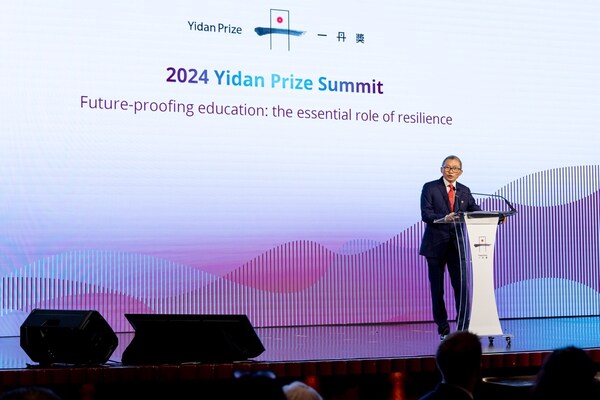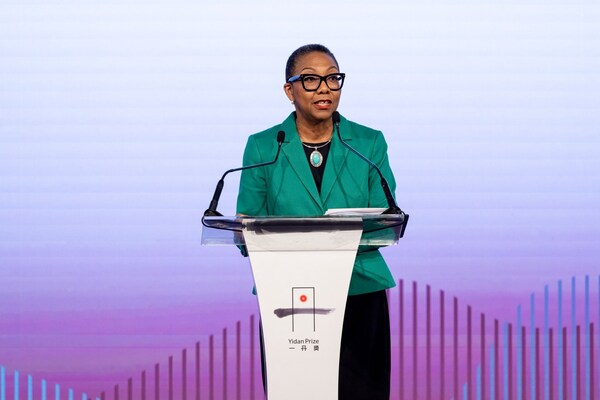 |
HONG KONG, Dec. 10, 2024 /PRNewswire/ -- The Yidan Prize Foundation, the global philanthropic foundation behind the world's highest education accolade, hosted the 2024 Yidan Prize Summit in Hong Kong on 9 December. Themed 'Future-proofing education: the essential role of resilience', this year's Summit offered a robust platform for researchers, policymakers, philanthropists, and education leaders globally to exchange ideas on innovative means to build resilience in a fast-changing world.
In his welcome remarks, Dr Charles CHEN Yidan, Founder of the Yidan Prize, shared what resilience means to him. He said, "In today's world, where civilization and technology make progress in tandem, where conflicts and cooperation co-exist, resilience is rooted in hope. Hope drives us to chase after a better life, realize our potential, and never give up." He emphasized that, "Resilience is essential to the future of education. Resilient people make resilient economies and thriving societies."

Dr Charles CHEN Yidan, Founder of the Yidan Prize, shared what resilience means to him in his welcome remarks at the 2024 Yidan Prize Summit.
Alicia Herbert, Director of Education, Gender and Equality and Special Envoy for Gender Equality at the United Kingdom Foreign, Commonwealth and Development Office, gave an opening keynote on the need to systematically foster resilience in education to prepare for an uncertain future. "Whilst there is an uplift in high quality research and evidence on what works to improve student learning outcomes in low-income contexts, the priority now is to ensure these interventions are embedded in government systems, and that they are sustainable at scale," Alicia said. "More effective investment is crucial, but money is not enough. Collaboration is key to building the resilience of individuals, educators and the wider system to ensure lasting transformational change."

Alicia Herbert, Director of Education, Gender and Equality and Special Envoy for Gender Equality at the United Kingdom Foreign, Commonwealth and Development Office, shared with 2024 Yidan Prize Summit audience on systematically fostering resilience in education to prepare for an uncertain future in her keynote speech.
In a guest sharing session, Professor Zongkai Yang, President of Wuhan University of Technology, showcased what AI-driven learning looks like. He explained that AI supports educators in co-teaching, data analysis, and problem-solving, while students can benefit from enhanced skill development to build future-ready skills.
Three panels discussed the role of resilience in education through the lens of learners, educators, and systems respectively. The key takeaways are:
1. Resilience is about giving students the skills to thrive in systems co-created with them
Encouraging dialogues with students, leveraging new digitalized platforms for education, and creating a learning environment beyond the classroom are essential to fostering effective engagement with students and resilient mindsets. A panel of learners who experienced higher education during Covid discussed what can enable learners to navigate changing futures confidently.
2. Resilience grows with trust, autonomy, and agency in educators
The Hon Adrian Piccoli, former New South Wales (Australia) Minister of Education, discussed with fellow panelists how we can engage teachers in education reform. The panel stressed the importance of creating a supportive environment that builds the emotional and social capacity of teachers. An environment that gives room for teachers to imagine and play a bigger role in education is key to building a system that in turn supports and sustains their resilience.
3. Resilience is about integrating diverse perspectives to strengthen education systems for all learners
Bridging research, policy, and practice is vital for crafting resilient education systems. Dr Becky Telford from UNHCR and her fellow panelists highlighted the need of involving marginalized groups, such as refugees, in developing effective solutions. Their discussion underscored the importance of governance, international partnerships, and integrating education with public health and environmental efforts in the face of challenges.
The Summit also featured fireside chats with this year's Yidan Prize laureates — Professor Wolfgang Lutz as well as Professor Mark Jordans, Marwa Zahr, and Luke Stannard from War Child Alliance. Wolfgang drew on his demographic research to highlight the benefits of education in strengthening climate resilience. He emphasized that tackling climate change goes beyond hard infrastructure, but also involves investing in human capital to develop climate adaptability. The War Child Alliance team shared that 'Can't Wait to Learn' not only widens access to quality education for learners disrupted by conflict and climate shocks, but also improves their well-being and resilience, bringing a sense of normalcy and hope for the future. The team stressed that for education technology programs to succeed, it is crucial to build teacher capacity and contextualize learning content working with children, partners, and ministries of education.
In closing the Summit, Lucy Lake, Yidan Prize Foundation's Director of Global Engagement, captured the essence of the relationship between education and resilience. "Education is key to fostering resilience — both at an individual and societal level. Yet we also have to ensure that education itself is resilient. We all have a part to play in that," Lucy said. "It means taking collective responsibility for education — recognizing that education is a common good – and if it is to be resilient, it needs to be adequately financed through public funding, and that there is collective accountability for the results."
The 2024 Yidan Prize Awards Ceremony on 8 December celebrated the 2024 Yidan Prize laureates for their work in ensuring equitable, quality education in diverse contexts. They join the Yidan Prize Foundation's global community of education changemakers.
Nominate education changemakers for the 2025 Yidan Prize
The 2025 Yidan Prize is open for nominations until 31 March 2025. To learn more about the opportunity or to nominate changemakers, please visit the Yidan Prize website: https://yidanprize.org/the-prize-and-nominations/nominations.
– ENDS –
Note to editors
Download images of the 2024 Yidan Prize Summit here.
About the Yidan Prize Foundation
The Yidan Prize Foundation is a global philanthropic foundation, with a mission of creating a better world through education. Through its prize and network of innovators, the Yidan Prize Foundation supports ideas and practices in education — specifically, ones with the power to positively change lives and society.
The Yidan Prize is the world's highest education accolade that recognizes individuals or teams who have contributed significantly to the theory and practice of education. It consists of two prizes, working in harmony: the Yidan Prize for Education Research and the Yidan Prize for Education Development. They're designed for impact: laureates of each prize receive an unrestricted project fund of HK$15 million over three years, helping them scale up their work, as well as a gold medal and a cash prize of HK$15 million. The project fund and cash prize are shared equally for teams.
For more information, visit yidanprize.org or contact media@yidanprize.org.
Find us @yidanprize on Facebook, Instagram, Twitter, and LinkedIn.